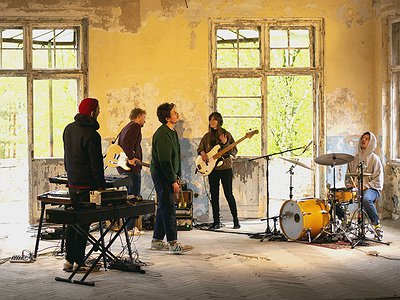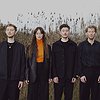Take us through a day in your life, from a possible morning routine through to your work, please.
Konstantin: I wake up. I try to arrive and feel where I am. I make my bed. Meditate. No phone for the first hour. Then I go to a café in my neighbourhood. I work on emails and things that need to be done. Afterwards, I cook something or meet a friend at a restaurant. I also like to eat alone in a restaurant. I like "eating meditation".
Then I sit in a park, sometimes with my trumpet and a notebook. I write down ideas or thoughts and question them. Most of the time people have these Bluetooth speakers and play music. I like to play the trumpet very softly. Then I don't have to decide what to play and can try to stay playful. Most of the time, musical ideas come to me and I develop them further.
In the evenings I have Wushu training with my group. This has become something like an alternative to practising the trumpet technique.
Eat. Meditate again. Sleep.
Bertram: Wow it‘s so different. I think my life is organized in bigger timeblocks than a conventional 7 days week. It‘s more like:
1 week on tour (chaos, I eat unhealthy, freedom)
4 days free (try to meet all my friends, wash clothes, can be cool but also very stressful)
1 week rehearsals (totally ocupied with this, I can’t answer any messages anymore, if it‘s in Berlin, I enjoy sleeping in my own bed for the nights, but I get a bit tense, because I still have no real time for myself)
2 weeks free (that's where recovery begins and creativity opens up, usually I practise a lot, and try to meet one beloved person each day)
1 day orga (which I also do always in between, but sometimes there are those intense outbursts)
4 weeks with ten different project, concerts, rehearsals, recordings, some half free days in between where I have to do a lot of little things (the worst times, it usually ends with making a plan on how to avoid that this will happen again)
1 week free (with one spontaneaus gig and a little video editing and mixing)
… and so on
Could you describe your creative process on the basis of a piece, live performance or album that's particularly dear to you, please?
Conic Rose: The first song “Honeylake” was created like this:
The basic chords of “Honeylake” were inspired by the Bach chorale 'O Haupt voll Blut und Wunden'.
Konstantin shows the sketch recorded on the piano to Bertram. Bertram plays chords as arpeggios on the guitar and continues to work on the song. Johnny produces something to it. Konstantin writes a polyphonic melody and records it. We wildly send the sketches back and forth, record drums with Silvan, search for basslines with Franzi. Then we leave the song for some time.
Bertram has a lot of tape delays and nerd toys lying around in his room and tries out everything possible in hours of night work. We recorded a trumpet solo through the tape delay, which almost sounds like a guitar. Later, when we all meet together in our studio in Berlin, Wedding, we listen to the sketches and think about what's missing, keep rehearsing and so on. We are quite meticulous about the sound and the details.
Few songs are created by playing at the same time. That usually comes afterwards for us.
Listening can be both a solitary and a communal activity. Likewise, creating music can be private or collaborative. Can you talk about your preferences in this regard and how these constellations influence creative results?
Konstantin: My favorite way to listen to music is during a concert. The energy of the group, being there with my whole body, feels very different from listening alone, and it helps me to really focus and feel.
I prefer to compose with the band. I like to trust the intuition and depth that each individual has within them, gather musical content and shape it together in a production process.
The challenge in this approach lies in the bundling, so that the composition does not become arbitrary and the message does not get lost.
How do your work and your creativity relate to the world and what is the role of music in society?
Bertram: I think music mostly turns people into a slightly more human version of themselves. Somehow it seems to activate tenderness, love and a will to improve - more than influencing in a destructive way. Being capable of this impact music can easily be utilized to connote positive feelings with products or ideas from whatever system - including capitalism, racisms, sexism, war …
That's a huge power and I think it‘s important to regularly check, which underlying system we support with art.
Johnny: Maybe it sounds weird, but for me this album shall ease people in whatever way they could need it for or want it for. Our music shall bring peace, love and inspiration for anything.
Art can be a way of dealing with the big topics in life: Life, loss, death, love, pain, and many more. In which way and on which occasions has music – both your own or that of others - contributed to your understanding of these questions?
Bertram: I’m very thankful for music as a language without words. For me it’s a lot easier to come into connection with my wounds or happiness through music or dance than through words or discussions.
I wouldn’t say that I have an understanding of all those topics you mention, but through music I sometimes felt a tip of their meaning for me. I love that music is so ambiguous, there is a lot of freedom speaking it, no wrong way to understand it, no boundaries of the topic in a musical conversation.
How do you see the connection between music and science and what can these two fields reveal about each other?
Bertram: For Conic Rose electronic devices, computers, preamps, tape delays, all these methods for sound capturing and manipulation have a huge importance and impact on our sound. We make use of all those inventions creative minds came up with. Our music wouldn’t exist without them and we are both thankful and enthusiastic that all those toys exist.
For me personally - coming from classical and jazz music - playing live or recording a whole take of an instrumental performance is still the most natural way of expressing myself. To me it feels like an own intelligence or capability to have an emotional language in production.
I’m always super impressed by the way Johnny - our keyboarder and producer - can focus on the whole journey and mood of a song while playing around with multiple synths and plugins all at the same time.
Creativity can reach many different corners of our lives. Do you feel as though writing or performing a piece of music is inherently different from something like making a great cup of coffee? What do you express through music that you couldn't or wouldn't in more 'mundane' tasks?
Bertram: I don’t feel that music or “art” is somehow superior to other actions or to the expressiveness of those. I’m very open and curious about anything that becomes art by the way people are devoting themselves to it.
For me there are other universal aspects like intention, clarity, mastery or creativity that might have an impact on how one can express through a certain medium.
Music is vibration in the air, captured by our ear drums. From your perspective as a creator and listener, do you have an explanation how it able to transmit such diverse and potentially deep messages?
Franzi: It seems like music has helped us to survive the brutal nature of this planet. Since it is so near to us, maybe we are a bit of music. Through the balance organ, the hearing organ is connected to every muscle, so music has an impact on the full body. It is communicating in the most direct way and therefore displays the full spectrum of emotions.
Bertram: It’s totally a miracle to me. (Even more since I read some books on common mathematic ratios shared by the overtone scale, planetary orbits and electrons while doing photosynthesis. I like reading this kind of stuff to overload my brain with things I cannot process or understand - but actually I’m not interested in explanations at all.)
I think generally in our culture and society we are underestimating the possibilities of our bodies and its senses a lot. There are so many layers we perceive through touch, looks, feelings in a room or sound - a lot more than science would agree on or will ever have explanations for.
I met incredible people from other disciplines being able to sense nuances I would never thought that they even existed.



